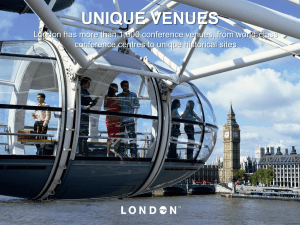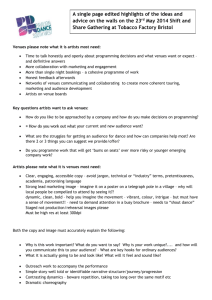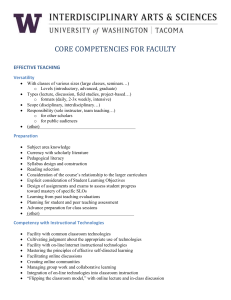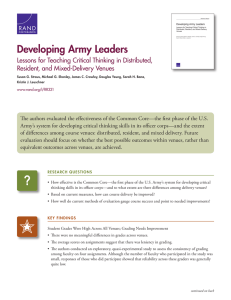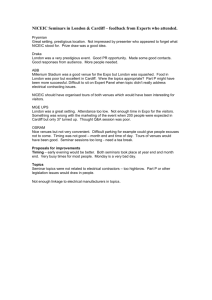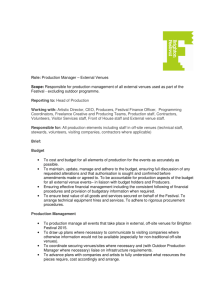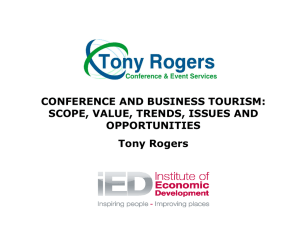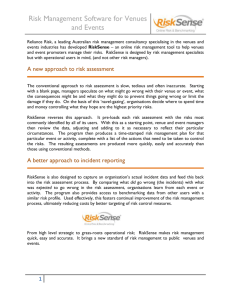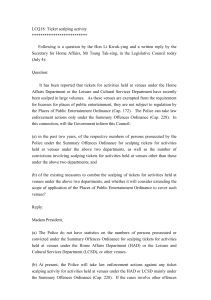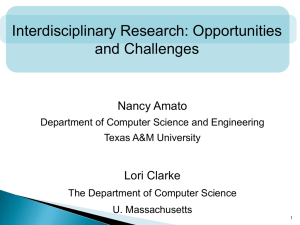ARTS CONSULTANT ROLE FOR TENDER (FREELANCE
advertisement
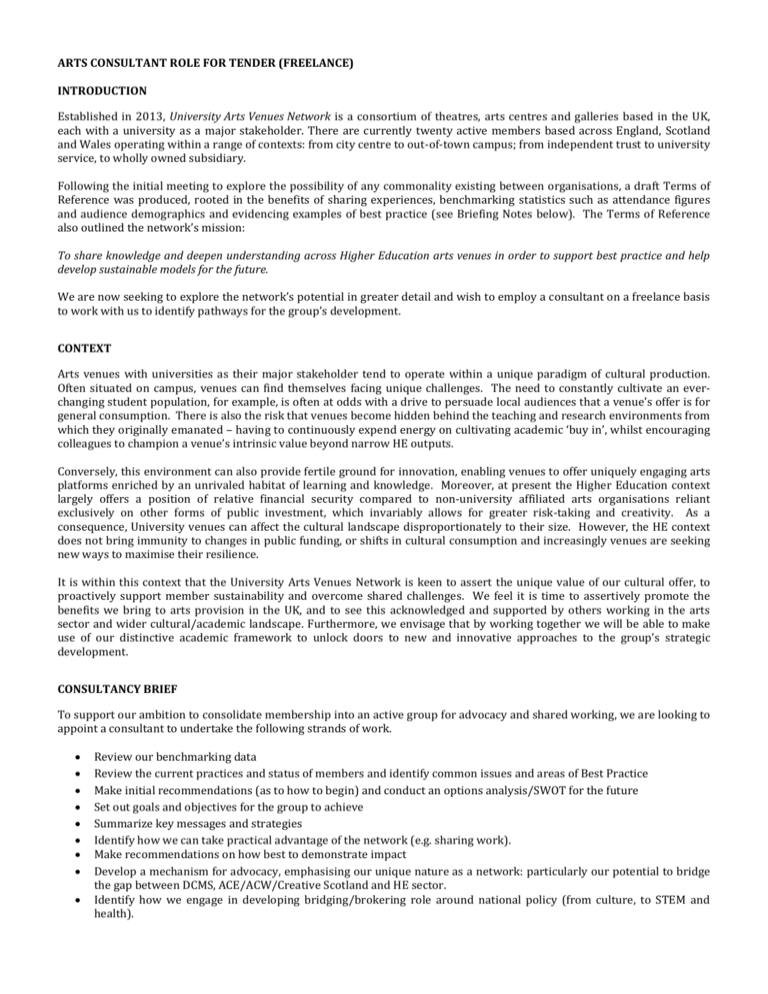
ARTS CONSULTANT ROLE FOR TENDER (FREELANCE) INTRODUCTION Established in 2013, University Arts Venues Network is a consortium of theatres, arts centres and galleries based in the UK, each with a university as a major stakeholder. There are currently twenty active members based across England, Scotland and Wales operating within a range of contexts: from city centre to out-of-town campus; from independent trust to university service, to wholly owned subsidiary. Following the initial meeting to explore the possibility of any commonality existing between organisations, a draft Terms of Reference was produced, rooted in the benefits of sharing experiences, benchmarking statistics such as attendance figures and audience demographics and evidencing examples of best practice (see Briefing Notes below). The Terms of Reference also outlined the network’s mission: To share knowledge and deepen understanding across Higher Education arts venues in order to support best practice and help develop sustainable models for the future. We are now seeking to explore the network’s potential in greater detail and wish to employ a consultant on a freelance basis to work with us to identify pathways for the group’s development. CONTEXT Arts venues with universities as their major stakeholder tend to operate within a unique paradigm of cultural production. Often situated on campus, venues can find themselves facing unique challenges. The need to constantly cultivate an everchanging student population, for example, is often at odds with a drive to persuade local audiences that a venue’s offer is for general consumption. There is also the risk that venues become hidden behind the teaching and research environments from which they originally emanated – having to continuously expend energy on cultivating academic ‘buy in’, whilst encouraging colleagues to champion a venue’s intrinsic value beyond narrow HE outputs. Conversely, this environment can also provide fertile ground for innovation, enabling venues to offer uniquely engaging arts platforms enriched by an unrivaled habitat of learning and knowledge. Moreover, at present the Higher Education context largely offers a position of relative financial security compared to non-university affiliated arts organisations reliant exclusively on other forms of public investment, which invariably allows for greater risk-taking and creativity. As a consequence, University venues can affect the cultural landscape disproportionately to their size. However, the HE context does not bring immunity to changes in public funding, or shifts in cultural consumption and increasingly venues are seeking new ways to maximise their resilience. It is within this context that the University Arts Venues Network is keen to assert the unique value of our cultural offer, to proactively support member sustainability and overcome shared challenges. We feel it is time to assertively promote the benefits we bring to arts provision in the UK, and to see this acknowledged and supported by others working in the arts sector and wider cultural/academic landscape. Furthermore, we envisage that by working together we will be able to make use of our distinctive academic framework to unlock doors to new and innovative approaches to the group’s strategic development. CONSULTANCY BRIEF To support our ambition to consolidate membership into an active group for advocacy and shared working, we are looking to appoint a consultant to undertake the following strands of work. Review our benchmarking data Review the current practices and status of members and identify common issues and areas of Best Practice Make initial recommendations (as to how to begin) and conduct an options analysis/SWOT for the future Set out goals and objectives for the group to achieve Summarize key messages and strategies Identify how we can take practical advantage of the network (e.g. sharing work). Make recommendations on how best to demonstrate impact Develop a mechanism for advocacy, emphasising our unique nature as a network: particularly our potential to bridge the gap between DCMS, ACE/ACW/Creative Scotland and HE sector. Identify how we engage in developing bridging/brokering role around national policy (from culture, to STEM and health). Support Research & Development given our unique position crossing over between student/ practitioner & academic/ research/enterprise/ cultural leadership – our position is unique Explore the role of fundraising for the network – European links, ACE/ACW/Creative Scotland – including scoping out practicalities of managing any funds for future. The work should take place during 2015 over a maximum of 16 days and include attendance at a minimum of one network meeting. The work will be delivered in a final report and a presentation to the network at an additional meeting later in the year. SKILLS, KNOWLEDGE AND EXPERIENCE You will have a proven track record in arts consultancy, preferably with a sound working knowledge of the academic context described above You will have worked on successful campaigns to raise profile for arts/culture agencies in today’s economic landscape You will have the ability to be proactive, maintaining positive relationships with stakeholders You will be a good communicator You will have experience in using audience measuring tools and be able to accurately benchmark/compare quantitative audience data and make analysis HOW TO APPLY To apply for this role please send the following: A proposal (including a work-plan and proposed fee) A CV with contact details for two relevant referees. A covering letter outlining how you meet the brief, citing examples of relevant projects. Please send applications to Yvette Harris at Warwick Arts Centre y.harris@warwick.ac.uk by 12pm on Friday 16 January. Selected candidates will be invited to interview at Embrace Arts, Leicester on Friday 30 January. For an informal conversation about the role please contact either Craig Morrow at Lincoln Performing Arts Centre – cmorrow@lincoln.ac.uk John Struthers at ICIA Bath – j.c.struthers@bath.ac.uk or Jamie Eastman at Live at LICA – director@liveatlica.org BRIEFING NOTES Who We Are Aberystwyth Arts Centre –Aberystwyth University – www.aberystwythartscentre.co.uk Derby Theatre – University of Derby – www.derbytheatre.co.uk Embrace Arts – University of Leicester – www2.le.ac.uk/hosted/embracearts Exeter Northcott – University of Exeter – www.exeternorthcott.co.uk The Gardyne Theatre – Dundee College – www.gardynetheatre.org.uk Gulbenkian – University of Kent – www.thegulbenkian.co.uk ICIA Bath – University of Bath – www.bath.ac.uk/icia/home/index.php Ivy Arts Centre – University of Surrey – www.surrey.ac.uk/schoolofarts/facilities/ivy Lincoln Performing Arts Centre – University of Lincoln – www.lpac.co.uk Live at LICA – University of Lancaster – www.liveatlica.org Macrobert Arts Centre – University of Stirling – www.macrobert.org Nottingham Lakeside Arts – University of Nottingham - www.lakesidearts.org.uk Peninsula Arts – University of Plymouth - www.peninsula-arts.co.uk/ Pontio Arts and Innovation Centre – Bangor University –www.pontio.co.uk Royal Welsh College of Music & Drama - www.rwcmd.ac.uk Taliesin Arts Centre – Swansea University – www.taliesinartscentre.co.uk Turner Sims / The Nuffield / John Hansard Gallery – University of Southampton – www.turnersims.co.uk / www.nuffieldtheatre.co.uk / www.hansardgallery.org.uk Warwick Arts Centre – University of Warwick – www.warwickartscentre.co.uk Network Terms of Reference Our Mission is: To share knowledge and deepen understanding across Higher Education arts organisations in order to support best practice and help develop sustainable models for the future. I rannu gwybodaeth a dyfnhau dealltwriaeth ar draws canolfannau celfyddydol mewn sefydliadau addysg uwch er mwyn cefnogi ymarfer da a helpu i ddatblygu modelau cynaliadwy i'r dyfodol The role of the network The network exists to support the membership in a number of key areas: A support network and the dissemination of best practice First and foremost it is a support network for Directors and Chief Executives to share knowledge, discuss areas of best practice, identify and resolve common challenges and spot new trends and developments within both the Higher Education Sector and the Arts industry. We are also keen that Marketing, Development and other teams meet and share best practice and our aspiration is to bring these teams together at key events. Benchmarking The venues involved are custodians and gatekeepers to an increasingly vital and developing sector. Through the network we are able to bench mark the levels of activity, investment and engagement. Advocacy The network is well placed to become a strong advocacy tool both inwards to the HIgher Education Sector and Arts Industry and outwards to other stakeholders who may be interested in the relationship between Higher Education and the Arts. The Network sits with a foot in both camps of arts industry and higher education and is therefore the perfect bridge between the two. Collaboration It’s a forum where collaboration is possible. collaborations on key projects. At each network meeting the Directors share programming opportunities and discuss future Development The continuing learning and development of the members is a vital part of the way we work. The group will invest in itself by engaging with external partners as well as sharing best practice with each other e.g. academics. Development also refers to the group’s aim to raise resources to deliver on particular areas of work that help to develop our USP as a body. The main priority is to seek resources to measure the impact of our work across all areas of operation, perhaps focusing on particular themes e.g. interdisciplinary working both in terms of art form and in relation to academic cross-departmental approaches. Membership The Network consists of a wide range of partners all of whom lead venues who sit within a Higher Education Context. Our models of working within this context are multifarious and our engagement with our own Universities is individual and bespoke. From totally independent art organisations whose governance sits outside of the University framework through to arts centres who are a fully embedded department of their university. What unites this group is a deep understanding of how Higher Education operates within an arts context, an understanding of how university structures can influence, develop and support the arts industry and a direct link to Higher Education. This often leads to unique interdisciplinary practice and collaborations with academics. Although Directors, Artistic Directors, Executive Directors and CEO’s lead the Network, the group has an aim to involve inter-institutional dialogue between other key University and Arts Venue staff. Specifically in the first instance, the network would like to bring its Marketing Departments together to form a task force leading on a particular key area of work. The group is cross border, encompassing venues from Scotland, England and Wales.
